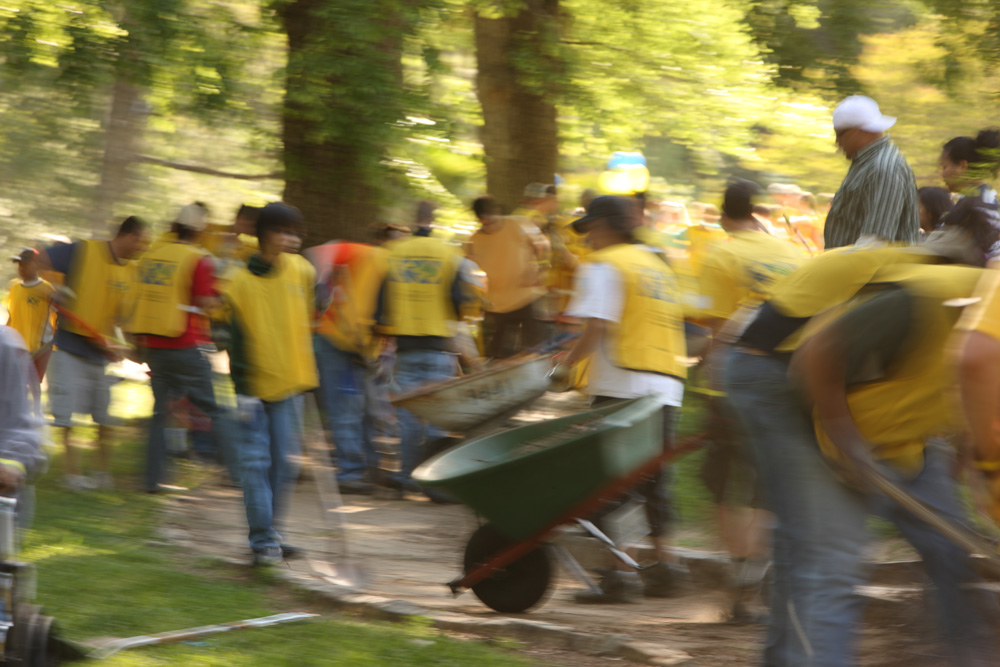Category: Cornucopia
-

A post-Columbian setting for the Book of Mormon
The result of writing Book of Mormon history from back to front, I think, resembles a cross between The Mission and Last of the Mohicans.
-

Wanted: Greener Grass
People leave the church because…well, I don’t know. I’ve had a few acquaintances who’ve decided to be done with it, but I’ve never sat down and talked with them about why. If I were to guess, it’s because they discovered things they didn’t like about the church and decided to head out to where things…
-

Looking for historicity in all the wrong places
If you think that the textual history of the Book of Mormon includes historical records, then you can’t avoid the possibility that a lot of Book of Mormon scholarship has been looking for the wrong people in the wrong place at the wrong time, and reading the wrong verses. The problem is that Book of…
-
Battle Hymn, verse 4
Last Sunday, we attended a family member’s baby blessing in a Spanish Ward in Utah. My rudimentary high school Spanish was no help at all.
-

Excuses for Stopping
The post is brought to you by my wife, Heather. Please be nice to her :) ****** It was time for Dane and I to have a discussion — the, “our baby is approaching 15 months old, do we want to have another one?” discussion. We currently have three wonderful, healthy children. At one point…
-
A New New Testament
I probably shouldn’t tell you this, but on more than one occasion, I have seriously considered stealing scriptures from the temple.
-
San Diego temple from the air
Google maps has added aerial views to a limited number of locations. I just saw (hat tip: Paula) that the San Diego temple is one of them. It’s a pretty cool feature. How do you see it? Unfortunately there’s no one-click link, because you have to enable aerial views. So it’s a slightly more elaborate…
-
Bloggers at Sunstone
The preliminary program for the Sunstone symposium is available, and includes many familiar names. Some of the bloggernacle folks who are listed include: Wednesday: 9:30 – John Dehlin (Mormon Stories) 2:00 – John Dehlin Thursday: 11:15 – Mormon feminism panel including Alisa (ExII) and Tresa (FMH) 2:15 – Tresa (respondent to Laura Compton) 4:45 –…
-
A Mormon Image: Cemetery in Carrol County
After retirement, my father turned to family history and temple work to fill his time. Most of this work has focused on researching ancestors from Virginia and North Carolina. I took this photo at a cemetery in Carrol County, VA, near the the birthplace of my father’s grandparents. My father is shown in the picture. …
-

The One True Hot Dog Stand
I’m hungry. I need a hot dog. Nate’s Dawgs smells delicious, but they’re a little pricey. Joe’s Rolled Meats are cheap, but they taste like cigars. Trader Moe’s dogs are additive free, so I guess they’re healthier than the others. But the girl at the Delirama counter is a total babe. How can I possibly…
-
Reincarnation, Mormon style
In a PEW survey a few months back, 24% of American adults indicated that they believed in reincarnation (ie, that people will be reborn into this world again and again). Apparently many Christians don’t have a problem overlapping their Christianity with Eastern beliefs.
-

A Mormon Image: Joseph’s Birthplace Memorial At Dusk
“I was born in the year of our Lord one thousand eight hundred and five, on the twenty-third day of December, in the town of Sharon, Windsor county, State of Vermont.” Joseph Smith History 1:3 By Gary Boatright Jr. ___ This picture is part of our ongoing series highlighting Mormon images. Comments to the post…
-

God’s Game
It seems to me that there are two contradictory sets of underlying assumptions about the plan of salvation. One is the “salvation as a game” perspective and the other is “salvation as a journey” perspective. The key difference between a game and a journey is that in a game the rewards are given by people,…
-

Adventures in the Journal of Discourses
I’m going to briefly argue for the general importance and contemporary relevance of the Journal of Discourses. But first, let me say: My grandpa (Max Olsen) is a very good man.
-
A Mormon Image: Brothers
We’ve been teaching our oldest son Peter that he’s a big brother to our younger son Jeremy. When Peter learned that Joseph Smith also had a big brother, he fell in love with the concept. Now whenever we go somewhere church-related, he asks, “Will there be a picture of Joseph and Hyrum?” By Robert Gibbons…
-
The hidden apologetics of Banner of Heaven
Scott at Bloggernacle Times has been putting on a very impressive Behind the Music retrospective about the old Banner of Heaven blog. The hair, the women, the trashed hotel rooms — it’s all there, complete with interviews with band members (Brian G. comes clean about the infamous “no brown M&M’s” contract), groupies band aids, and…
-
Interreligious — not Irreligious — Diplomacy
Before I sign off – or am run out of town – I might serve you well by offering a perspective on an extremely interesting conference held last weekend on the USC campus in LA. The conference was titled “Mormon Engagement with World Religions,” and was organized by Randall Paul, founder of the Foundation for…
-
Taking it to the Third Order
Since my “second-order” questioning elicited little discussion (albeit 200+ responses), let me try to “take it up a notch,” as George Constanza might say (forgive the erudite cultural references). Herewith, the “third order,” the Meta-Meta Meditation on the problem of politics/morality/religion. (I gather my guest privileges will expire before we have a chance to go…
-

Late-night Doctrinal Discussions
I’m in the final semester of an MBA program at Oregon’s Willamette University. I took a job in California a couple months ago. That means I’ve got a killer commute to class. All that to say that my time for deep, theosophical discourse with my wife is limited to the occasional late-night discussion when we…
-
LDS & Public Square
OK, now that we’ve basically cleared up any confusion surrounding the ontological status of agency and atonement, let me see what you think about something a little more… political. For many years friends and I had considered the possibility of some kind of political-philosophy oriented educational foundation that would try to help religious people, and…
-

Life’s Tough When You’re a Girl (or a Boy)
A girl I know was considering taking a commissioned sales job at a truck stop. She commented to me, “Maybe I’ll wear a tight shirt and a push-up bra. I bet that would help with my sales numbers.” My immediate reaction was, “Don’t sell yourself like that!” I’m told that there is a correlation between…
-
Eye Single
A dear friend–who is a single, never-married, 40-something, extremely faithful LDS woman–emailed this to a few friends. I share it with her permission, having edited out identifying information:
-
A Fortunate Fall and Ontological Agency, cont.
Thanks for some good suggestions, objections, discussion re. my first post. Let me try to kick the can down the road just a bit further with a few more reflections: First, the Fortunate Fall — that the Fall is good news, is extremely well attested in quite authoritative (or at least, to me, impressive) statements…
-

A Mormon Image: Knocking on Dracula’s Door
Even Dracula and his minions deserve to hear about the Book of Mormon. by Dan Dubei
-
The Doctrinal Problem of Evolution
The scriptural problem of evolution is well understood. The creation accounts in Genesis and other scripture are not obviously describing speciation through natural selection.
-
Agency and Atonement
Thanks, Marc for the introduction, and for the opportunity to converse with friends old and new at T & S. Before I annoy (at least some of) you with some political reflections, let me run past you some thoughts on agency and atonement that occurred to me in trying to teach Religion 121 (Book of Mormon…
-

A Mormon Image: Mormon Helping Hands
About 800 Members of the Sacramento California Stake and their friends donated more than 2,000 man-hours at the City of Sacramento’s William Land Park, which has seen its finding cut by 60 percent in recent years and its maintenance staff trimmed from 22 to seven employees. Volunteers focused on numerous work projects, including historic trail…
-

Reasoning the Doctrines
The question of the truth of the church didn’t enter my consciousness until I was about twelve years old. That was the age when I started discussing religion with my school friends. I remember a conversation I had with a friend after school. His family was not religious, and he was curious about my beliefs.…
-

“And What Do The Women Do?”
I credit any awareness I have of gender issues in the church to the challenging, patient, and frank discussions that take place within the bloggernacle. Reading the first-hand experiences shared by many sincere sisters here has forced me to reconsider the paradigm I was comfortable in — the one where men and women have separate…
-
A Reading of President Packer’s “Presiding in the Home”
During a great discussion of our most recent general conference, one very bright young woman in my class sincerely asked, “President Packer said that ‘the father presides at the table’ – and I just want to know what that means.”
